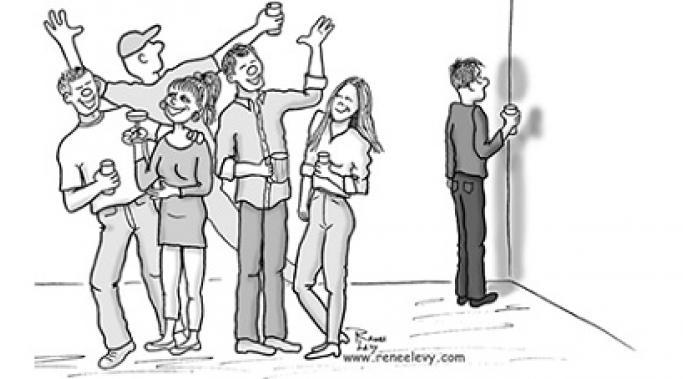Blogs
These days, when I think about Dissociative Living, I think of it as a series of letters from me to you – "you" being anyone who lives with Dissociative Identity Disorder (or DDNOS, but I lump you guys under the DID umbrella for efficiency’s sake). It feels personal to me, like an intimate – though public -- correspondence. These letters I’ve written are about a thing we have in common, a serious thing, oftentimes a painful thing. I feel uneasy about some of those letters. I feel uneasy because I know just how vulnerable and suggestible a person can be when they’re struggling with something serious and painful. These days, when I think about Dissociative Living, I think that some of my letters may have hurt you. To begin with, there’s that last letter: the one about how I’m crazy.
Stop focusing on failures and mistakes. Learn from previous experiences and gain self-confidence with these tools.
There’s no doubt about it: When you’re trying to achieve any task it’s much easier to do when you have the support of family and friends. Watch any sport and you can see how true this is - the fans in a stadium cheering on a team or player, the crowds that line the route of a marathon shouting encouragement, or even the caddy who walks with a golfer softly speaking words of belief in a successful outcome for the upcoming hole. Humans are social beings and, as such, we seek and even crave the connection of others when we attempt a difficult and meaningful task.
Lately I've been caught in a trap of worrying about everything I need to do, instead of simply doing the things I need to do. This causes a big increase in my depression symptoms.
I look around my apartment and the whole place is a giant mess. Dirty dishes lie everywhere, pretty much every piece of clothing I own needs to be washed, and instead of dust bunnies lying on my floor I have what my mom calls "dust wolves."
Instead of just gathering up my dirty dishes, I lie down on my couch. I start thinking in negative spirals, about how I mess up everything in my life. I think about all the times I've failed at things, and my self-doubt starts building. I can't even keep a one bedroom apartment clean! How am I ever going to have a house one day?
Mental Illness Awareness Week 2014 continues. The week means slightly different things to different people (as in specific awareness, the attitude behind the desire for awareness, etc.) To me, it means something relatively simple. It means looking at people in a new way, leading to a new understanding of them as human beings. Mental illness happens to be part, just part, of who they/we are. Awareness of the whole package brings understanding of the whole person.
About a month ago the news was awash with headlines like: This Blood Test Can Predict Suicide Risk, Scientists Say (thank you, Time.com) suggesting that, well, there was now a blood test to find out if you’re at risk for suicide.
When I heard this I thought it was so outrageous that I dismissed it out of hand. But the major news organizations reported headlines like this and people, amazingly, bought into it.
Now, I’m not saying there wasn’t a kernel of truth there, there was, but suggesting there’s a blood test for suicide is like saying there’s a blood test for people who can’t parallel park.
A while back I wrote an article on how symptoms of combat posttraumatic stress disorder (PTSD) can be seen in the children of veterans. Not surprisingly, PTSD symptoms can also be seen in some spouses of those with combat PTSD, even though the spouse never directly went through the trauma the veteran did. This is often known as secondary traumatic stress or secondary traumatic stress disorder.
We live in a performance-based society, as any adult can tell you. Our culture is actually much more interested in what someone can do rather than who they are. And yet, our social values of individualism, freedom, self-expression, and "believing in yourself" are among our most cherished ideals.
We encourage children to dream big about who they want to be when they grow up, telling them they can become anything they desire. So, naturally, they dream of being astronauts, pop stars, doctors, firefighters, and sports figures. Some kids want to skip the whole career thing and just be rich and famous.
Isn't it ironic that kids fantasize about growing up to have some of the most performance-based professions on earth?
It's an unfortunate reality that people within the lesbian, gay, bisexual, transgender, questioning (LGBTQ) community have a harder time accepting and loving themselves. Society's message toward anyone who is not straight or cisgender (a person whose sex matches their gender) is often negative and harshly critical. Lesbian, gay, bisexual, and transgender people are seen as outcasts and freaks. I am pansexual and I have, in my history, felt like one of those freaks.
Managing an anxiety disorder is a bit like navigating a minefield. There are safe places to step and there are dangerous places to step. The trick to navigating a minefield successfully is to not step on any mines, which is made easier by being able to detect where the mines are buried. The trick to navigating anxiety is much the same. Avoid the anxiety and/or panic attack by knowing how to avoid the triggers.









